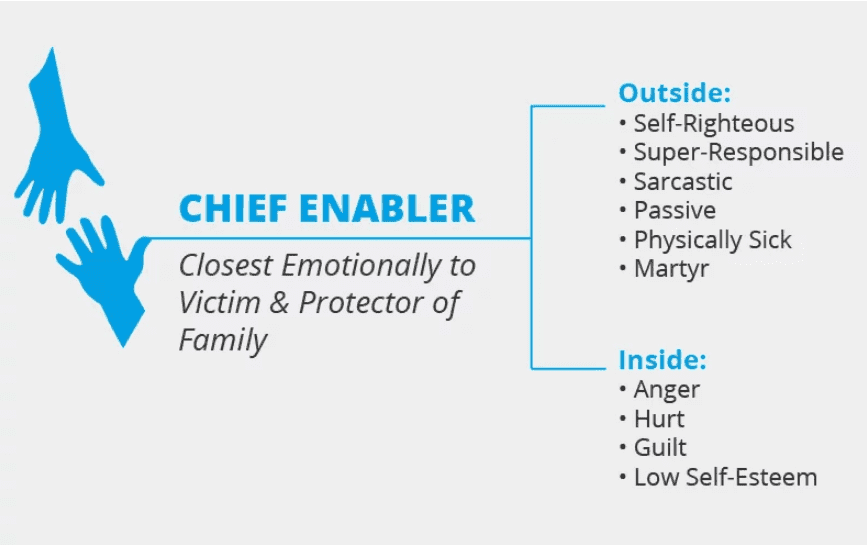We try to help the people we love, but when your loved one is addicted to drugs or alcohol, the dynamic of your relationship can change.
Enabling
The desire for helping others, particularly the people who are close to your heart, is a noble human instinct. Parents want to see their kids’ make accomplishments in school and other parts of their lives. Spouses are always there to help each other solve issues. Friends are ready to help each other, whether it’s a personal or business relationship. Unfortunately, this basic desire to help can have the opposite affect when addiction is involved.

What Is Enabling?
Enabling is a form of helping borne out of kindness and concern that, no matter the intention, doesn’t actually help. Instead of really addressing a problem, like addiction, you’re helping to cover it up, which makes it worse. Families of addicts often end up enabling — it’s a common dynamic between alcoholics and their spouse, parents or other close family members.
A spouse who makes excuses for addictive behaviors is enabling the addict. When you clean up after your alcoholic father and erase all evidence of his drunken episode, you enable him to continue abusing alcohol. When a friend helps his drug-addict friend by giving him money, he’s perpetuating that addiction.
Enablers can become addicted to helping the addict, creating a delicate balance in their relationship. The more the addiction rages on, the more important the enabler feels. An addict will focus almost exclusively on the substance of abuse. The enabler subconsciously uses the emergency situations created by the addiction to get noticed, feel important and participate in the relationship.
Just like the behavior of an alcoholic is changed by the addiction, so is the character of the enabler. Addiction creates enablers out of loving, well-meaning people. It turns what would normally be acts of kindness into detrimental behavior.
How to Stop Enabling Bad Behavior
It can become very difficult to withhold your help and let someone you love face the consequences of their substance abuse. It may feel like you’re refusing to love them — but really, it’s the opposite. When you stop your enabling behavior, your addicted loved one has a chance to recognize their problem and try to fix it.
Here are some tips that might help you remind yourself to stop enabling:
– Realize you can’t change someone else’s addiction. If you continue to enable it, you’re hurting yourself and helping no one.
– End your denial. Stop looking for excuses and accept that your loved one is addicted.
– Learn ways to support your loved one without enabling their addiction.
– Do not help until you’re asked. Let your loved one reach a point where they recognize they have a problem.
– Assign blame appropriately instead of taking it all on yourself.
– Maintain firm boundaries about the behaviors and responsibilities you’ll accept and those you won’t.
The best thing you can do for an addicted loved one is allowing them to confront their issues. Hiding the problem and the consequences isn’t really helping. When your spouse or child is ready, you can help them get sober, but you must stop helping them cover up the consequences of an addiction.
People learn from the consequences of their actions. It’s difficult to stop enabling somebody you adore, but remember that by not enabling, you are helping. You are demonstrating love for that person and yourself by ending this type of behavior.
How to Help an Enabler
To understand how to stop being an enabler to a drug addict, you need to know how to help yourself. Silence is the common scenario between a family and a drug addict. No one wants to talk about the problem because it’s too painful and has a negative social stigma attached to it.
Support groups for the families of drug-addicts are the best way to eliminate the sense of loneliness. Family members can meet others who are going through the same situation to get suggestions and advice. Support groups share tips on how to stop enabling bad behavior and other aspects of dealing with an addict-enabler relationship.
To learn more about enabling and support groups for family members, contact Tranquil Shores.
Signs You Might Be An Enabler

+ The Chief Enabler (Closest Emotionally to Victim & Hero)
- Outside: Self-Righteous, Super-Responsible, Sarcastic, Passive, Physically Sick, Martyr
- Inside: Anger, Hurt, Guilt, Low Self-Esteem
Tranquil Shores knows that substance abuse is a family disease. We understand the enabler and have the resources to counsel you and your loved one as you move from enabler to helper.
The following are some simple questions to ask yourself to determine if you are being an enabler:
- Have you ever “called in sick” for the alcoholic or addict, lying about his or her symptoms?
- Have you accepted part of the blame for his/her drinking or behavior?
- Have you avoided talking about his or her drinking or using out of fear of the response?
- Have you bailed him or her out of jail or paid for legal fees?
- Have you paid bills that he or she was supposed to have paid?
- Have you loaned him or her money?
- Have you tried drinking or using with him/her in hopes of strengthening the relationship?
- Have you given him or her “one more chance” and then another and another?
- Have you threatened to leave and did not?
- Have you finished a job or project that the alcoholic/addict failed to complete?
If you answered 3 or more of these questions with “yes,” you have been enabling, not helping, the alcoholic/addict.
Let Tranquil Shores help you help him or her break the cycle of enabling and set a path for the road to recovery. Get help today and Reclaim Your Life!





